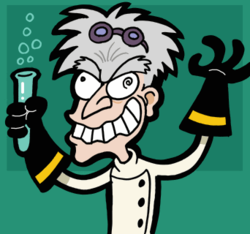Cartoon
|
|
A cartoon is any of several forms of art, with varied meanings that evolved from one to another.
| Contents |
Historical
In its original historical meaning, a cartoon is a full-size drawing made on paper as a study for a further artwork, such as a painting. Cartoons were typically used in the production of frescoes, to accurately link the component parts of the composition when painted onto plaster over a series of days. Cartoons by painters such as Raphael and Leonardo da Vinci are highly prized in their own right.
Print media
SubstanceandShadow.jpg
In modern print media, a cartoon is an illustration, usually humorous in intent. This usage dates from 1843 when Punch magazine applied the term to satirical drawings in its pages, particularly sketches by John Leech. The first of these parodied the preparatory cartoons for grand historical frescoes in the then-new Palace of Westminster. The original title for these drawings was Mr Punch's pencillings and the new title "cartoon" was intended to be ironic, a reference to the self-aggrandising posturing of Westminster politicians.
Modern gag cartoons are found in magazines and newspapers and generally consist of a single drawing with a caption immediately beneath or (less often) a speech balloon. Many consider New Yorker cartoonist Peter Arno the father of the modern gag cartoon (as did Arno himself). Gag cartoonists of note include Charles Addams, Charles Barsotti, and Chon Day.
Editorial cartoons are a variation of this, found almost exclusively in news publications. Although they also employ humor, they are more serious in tone, commonly using irony or satire. The art usually acts as a visual metaphor to illustrate a point of view on current social and/or political topics. Editorial cartoons often include speech balloons and, sometimes, multiple panels. Editorial cartoonists of note include Herblock and Mike Peters.
Comic strips are found daily in newspapers worldwide, and are usually a short series of cartoon illustrations in sequence. They are not as commonly called "cartoons" themselves, but rather "comics" or "funnies". Nonetheless, the creators of comic strips - as well as comic books and graphic novels - are referred to as "cartoonists". Although humor is the most prevalent subject matter, adventure and drama are also represented in this medium. Noteworthy cartoonists in this sense include Charles Schulz, Jim Davis, Scott Adams, and Mort Walker.
Motion pictures

Because of the stylistic similarities between comic strips and early animated movies, "cartoon" came to refer to animation, and this is the sense in which "cartoon" is most commonly used today. These are usually shown on television or in cinemas and are created by showing illustrated images in rapid succession to give the impression of movement. In this meaning, the word cartoon is sometimes shortened to toon (which may be a corruption of "Looney Tunes" and was popularized by the movie Who Framed Roger Rabbit?). Although the term can be applied to any animated presentation, it is most often used in reference to programs for children, featuring anthropomorphized animals, superheroes, the adventures of child protagonists, and other related genres. Animated material which does not fit the traditional conventions of Western animation, such as Japanese anime is less often called a "cartoon", but this varies. Likewise, the term is sometimes avoided in reference to material intended for adult viewers (such as pornographic hentai), to make clear that it is not appropriate for children.
See also
External links
- Punch website's history of cartoons (http://www.punch.co.uk/)
- New Yorker's Cartoon Bank (http://www.cartoonbank.com)
- Daryl Cagle's Professional Cartoonists Index (http://www.cagle.com/)
- Don Markenstein's Toonopedia (http://www.toonopedia.com)
- Big Cartoon Database (http://www.bcdb.com/)
- Golden Age of Cartoons (http://www.goldenagecartoons.com/)
- Toon-Cycle: Cartoon community and media resources (http://www.toon-cycle.com/)de:Cartoon
